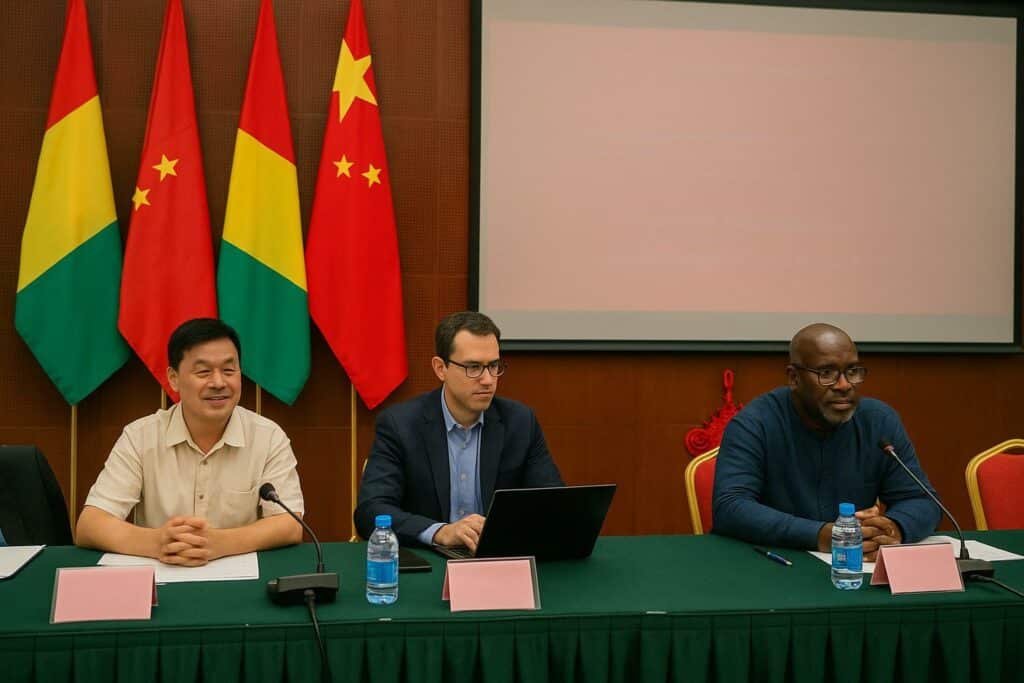A partnership reaffirmed in Beijing
The echo of the red-carpet welcome extended to President Denis Sassou Nguesso in Beijing still reverberates in Brazzaville’s chancelleries. At a press briefing held on 11 September, China’s ambassador An Qing portrayed the visit as the latest chapter in a relationship that has grown from an early strategic partnership in 2016 to what she called a “comprehensive strategic cooperative partnership”. By revisiting the milestones—President Xi Jinping’s 2013 tour, the elevation of ties in 2016 and the recent ceremonies marking the 80th anniversary of the end of the Second World War—the envoy sketched a continuum of high-level political trust that now underpins economic decision-making.
Zero customs duties: levers for diversification
Centrepiece of the current agenda is Beijing’s pledge to abolish import tariffs on goods originating from fifty-three African nations, Congo-Brazzaville included, a measure first announced after the coordinators’ meeting of the Forum on China–Africa Cooperation. For Congo, the stakes are tangible. The Central African state posted a 2.7-billion-dollar trade surplus with China last year, confirming Beijing as both its principal export market and the leading source of foreign investment. Ambassador An insists the zero-tariff window will do more than widen the surplus: it should improve the overall business climate, lure additional investors and gradually enlarge the country’s export basket beyond its traditional commodities. In her words, the initiative constitutes “a long-term foundation for development”.
Infrastructure projects accelerate connectivity
Beyond the fiscal incentive, the two capitals are pressing ahead with signature infrastructure schemes. Phase III of the National Telecommunications Coverage Project is close to completion. New communication towers now punctuate the avenues of Brazzaville and other urban centres, delivering faster and more stable internet access to households and small enterprises alike. The diplomat also highlighted the ongoing rehabilitation of roadways surrounding the Sino-Congolese Friendship Hospital, underscoring Beijing’s pivot toward social infrastructure alongside flagship construction ventures.
2026: a cultural catalyst on the horizon
Soft power will soon complement hard infrastructure. Declaring 2026 the Sino-African Year of Human and Cultural Exchanges, Beijing plans a cascade of artistic residencies, academic forums and youth programmes designed to weave people-to-people ties into the economic fabric. Preparatory committees have already begun curating exhibitions and workshops, Ambassador An revealed, adding that such initiatives reflect both sides’ intent to nourish “cooperation in culture, education and the arts” in tandem with trade.
Diplomacy anchored in the One-China principle
The geopolitical dimension of the partnership surfaced as well. Restating that the Taiwan question is an “internal affair of China”, the ambassador thanked Brazzaville for its unwavering adherence to the One-China principle, reiterated during President Sassou Nguesso’s meetings in Beijing. The mutual reassurance on sovereignty issues provides, in her assessment, a stable diplomatic backdrop against which economic projects can flourish unimpeded.
Regulatory Convergence: Turning Zero Tariffs into Sustainable Market Access
From a legal and economic standpoint, the zero-tariff decision obliges Congolese exporters to fine-tune compliance with Chinese sanitary and phytosanitary standards if they are to capitalise fully on the measure. Specialists in Brazzaville’s chambers of commerce argue that certification procedures, traceability and quality control will become decisive competitive factors once duties disappear. Conversely, Chinese investors exploring green-field operations in the country will navigate Congolese investment codes that now promise improved safeguards and dispute-resolution mechanisms—an area the government has pledged to refine in harmony with continental benchmarks. In the medium term, the confluence of regulatory clarity on both sides could accelerate diversification of local agriculture and light manufacturing, diluting Congo’s historical dependence on hydrocarbons.
Turning Political Goodwill into Lasting Economic Gains
The ambassador’s briefing projects an image of dynamism: zero duties to spur exports, telecom towers to knit the digital backbone, cultural diplomacy to humanise commercial ties. While concrete results will hinge on execution, the architecture of the Congo–China relationship appears calibrated for mutual benefit, bolstered by consistent political dialogue and converging strategic interests. For Brazzaville’s policy-makers and private sector, the priority now lies in transforming goodwill and tariff advantages into sustainable, diversified growth trajectories.

